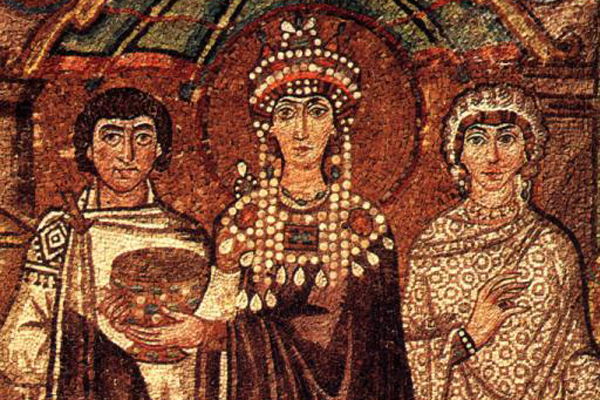How a Young Performer Became the Most Influential Empress of the Byzantine Empire
Her Road to the Throne
Unlike many of the other great monarchs we here at SharpHeels have profiled in March as part of Women’s History Month, Empress Theodora of the Byzantine Empire came from very humble beginnings. (The Byzantine Empire was the Greek-speaking remainder of the Roman Empire that lasted until the late Middle Ages, with its capital city being Constantinople.)
Theodora was born in 500 A.D., the daughter of a bear trainer and theatrical performer. Although her birthplace and early begins are often debated, it is known that she followed in her mother’s and sister’s footsteps by becoming a performer in Constantinople – which, in that era, often meant participating in the sexual services offstage, as actresses and other performers were known to do. During her early years, Theodora traveled to North Africa with a general of the Byzantine Army. There, she was treated poorly and after four years, made her way back to Constantinople, but during her travels, she stopped in Alexandria, Egypt, and converted to Christianity.
Once Theodora returned to Constantinople in 522, she took up a different profession as a wool-spinner and caught the eye of the heir to the Byzantine throne, Justinian I. Justinian became smitten, and was determined to marry Theodora, despite his uncle’s objections and an ancient Roman law forbidding members of the royal family to marry actresses. Justinian finally succeeded at repealing the law and immediately married her. By then, Theodora had already had given birth to her daughter, and although it is unknown whether Justinian was her father, the emperor treated Theodora’s daughter as if she were his own.
An Extraordinary Empress, with Lasting Influence
As might be imagined, many were opposed to Theodora ruling at the time, but she proved worthy of her post during difficult times for Constantinople.
During the Nika Riots in 532, due to tensions between the two opposing political factions, Justinian and his loyal followers were preparing to leave the empire and live a life in exile. It was Theodora who gave an inspiring speech to the empire that convinced Justinian to stay and send his troops to defeat the two factions. Justinian and the people of the Byzantine Empire never forgot how Theodora’s determination helped them through their struggle, and Justinian was eternally grateful to Theodora for saving his throne. From then on, Theodora was considered co-ruler and worked with Justinian to bring vitality back to Constantinople.
Aside from working for peace between the two main factions of Christianity, and overseeing the construction of aqueducts, bridges and gorgeous churches, including The Hagia Sophia – one of the great wonders of the medieval ages — Theodora also made substantial changes to the living conditions of women in the empire. Perhaps because of her own experience, she was adamant about giving females more rights and in particular about transforming the lives of poor women. Her passion for Christianity and women’s rights led her to pass laws that prohibited forced prostitution and shuttered brothels. She also established safe houses where former prostitutes could find shelter, enacted a death penalty for rape, strengthened divorce and property ownerships rights for women, and made it illegal to sentence female adulterers to death.
It can be said that Theodora was, at the very least, an impressive empress. Very few expected her to take on the crown of the Byzantine Empire with such strength and passion for change, but she did not let the fact that she was not of royal birth stand in the way of achieving her vision for the empire. She eventually died from cancer in 548, which left her husband and co-ruler Justinian heartbroken. However, her influence was so great that he carried on her efforts throughout the rest of his rule. To this day, Theodora is widely recognized for bringing peace to the two conflicting factions of Christianity (the Monophysites and the Chalcedonians), and furthering the progress of women in the empire.
Valuable Lessons from Theodora’s Vision
Theodora was both an unexpected ruler (she married into her royal role) and an unexpected leader of change (accomplished solely thru putting her own ideals into action). She worked to restore peace between fighting political and religious factions, and positively changed the way women could function in her society. She has left us with some very significant lessons still relevant to women today:
- Do not shy away from being a leader even when others have doubts or do not believe in you.
- Work to establish harmony within your environment between factions to maximize an amicable co-existence.
- Speak your mind, even when your opinion may not be the popular one.
- Take responsibility for those you are in charge of, in order to better their performance and allow them to produce greater work.
- Don’t let social norms keep you from making changes to the current way situations or people are regarded.
- And last but most certainly not least, work to further the advancement and empowerment of women in all aspects of life!
TAGS: Byzantine Empire career tips Empress Theodora leadership women women's rights
 Effective Communication
Effective Communication Women Making History
Women Making History Grants & Funding Sources
Grants & Funding Sources Interview Prep
Interview Prep Impactful Leadership
Impactful Leadership Dressing for Work
Dressing for Work Dressing for Your Style
Dressing for Your Style Interview Style Tips
Interview Style Tips Women's Stocking Stuffers
Women's Stocking Stuffers Gift the Busy Traveler
Gift the Busy Traveler Airport Layover Activities
Airport Layover Activities Traveling & Eating Healthy
Traveling & Eating Healthy Travel Like a Boss Lady
Travel Like a Boss Lady The Dual California Life
The Dual California Life Gifts for Thanksgiving
Gifts for Thanksgiving Summer Reading List
Summer Reading List Top Leisurely Reads
Top Leisurely Reads New Year, New Books
New Year, New Books Life Lessons from a Sitcom
Life Lessons from a Sitcom Oprah, Amy or Amal?
Oprah, Amy or Amal?














